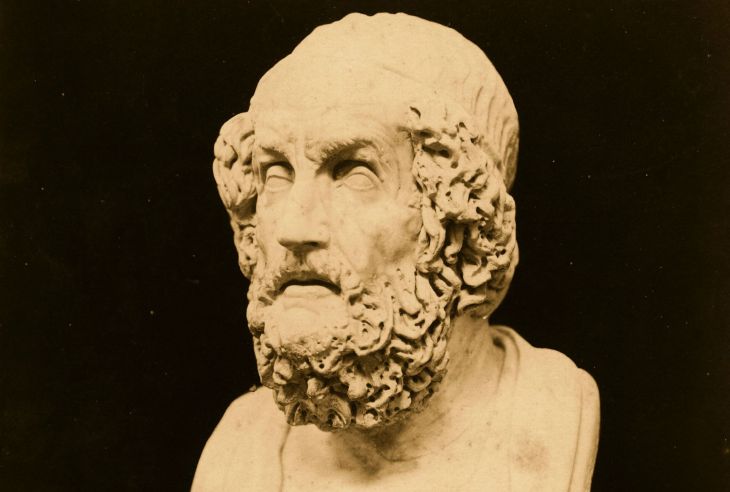Milan Kundera has said that Homer’s Odyssey was the first novel. I’m not so sure — the verse kind of gets in the way — but it’s certainly the earliest surviving great travel book.
Ever since the 5th century BC, Odyssey obsessives have been trawling the Mediterranean in their hero’s footsteps to track down the real Cyclops or the real Scylla and Charybdis. Herodotus and Thucydides identified the Land of the Lotus Eaters with a spot in Libya. In the 4th century BC, Euhemerus, a Greek Sicilian, maintained that, beneath all the monsters and the myths, there lay pure historical fact. The romantics who go in search of the real Odysseus — and the real Homer — are called ‘euhemerists’ as a result.
Daniel Mendelsohn, a writer and classics teacher at Bard College in upstate New York, is the latest euhemerist to follow in Odysseus’s wake. The difference is that Mendelsohn brings along his father Jay (a retired 81-year-old computer science professor and grumpy Woody Allen type) on his cruise around Homer’s Mediterranean.
Jay takes to onboard life and the evenings overlooking the wine-dark sea — or the grape-dark sea, as Nicky Haslam told me the Med looked like this summer. All goes well until the Corinth canal is closed, and so the Mendelsohns never get to Ithaca, which is bloody annoying — not least because Odysseus managed to make it home 3,000 years before the Corinth canal was constructed. Ithaca is a tiny, unspoilt, utterly bewitching island — still much as it was in the time of Odysseus — and ever since the 8th century BC, getting to Ithaca has had a powerful, symbolic meaning: of coming home, of completion, of a satisfactory end.
In both real and symbolic senses, the Mendelsohns, and An Odyssey, don’t reach Ithaca. The book is trying to do too many things: to be a primer to the Iliad and the Odyssey; a memoir of growing up as a classicist and becoming a classics teacher; and a biography of Jay Mendelsohn.
The primer bit is well-informed and faultless — but, still, you’d be better off reading the originals. And the classicist’s memoir has its moments when Mendelsohn describes his brilliant don at university, Jenny Strauss Clay. She is the great eccentric classics teacher we all yearn for, with a ‘lithe, coiled frame, a catlike calm, the Louise Brooks bob, the cigarettes’. Apart from Greek and Latin, she introduces the author to the magical world of Proust, George Seferis and linguine with vegetables from her own garden.
The memoir grows clunky when Mendelsohn starts explaining his teaching methods: ‘I told [my students] how to access the course website, where I’d set up a discussion board for each session.’ And the dullness deepens when he gets on to the Dad and Lad biography. There’s a form of memoir on both sides of the Atlantic that mistakenly thinks it benefits from precise descriptions of the everyday: ‘The house I grew up in was crisply well-organised, the contents of every closet, refrigerator and freezer hung or shelved or stacked with rigid rationality.’ Thanks for the domestic update, but no thanks.
The highlights of this mixed bag of a book come when Jay attends his son’s Homer induction classes. It’s a wonderful comic premise, straight out of an American sitcom — grumpy dad meets the fresh-faced freshmen; Homer Simpson meets Homer. Jay had promised Daniel he would stay quiet in his lessons, but he can’t resist wisecracking, and outsmarting him, in front of the class. ‘If that guy is a classicist,’ he says, jabbing a finger at his son, ‘it’s because he gets it from me.’
Daniel is convinced the whole exercise is going to be a nightmare. In fact, it brings father and son closer together — in a charming, non-schmaltzy way. Jay turns out to be a natural classicist. Again and again, his impulses about the Odyssey are original and instinctively right. ‘I don’t think he’s such a great hero,’ he barks about Odysseus, ‘What kind of leader loses all his men? You call that a hero?’
When Mendelsohn is trying to explain homophrosyne, the Homeric term for like-mindedness between husband and wife, Dad breaks out into ‘That Old Black Magic’:
‘You’re the lover I have waited for/ You’re the mate that fate had me created for…’ It’s like Johnny Mercer knew his Homer. There’s that one person made just for you by fate, and nobody else will do.
At moments like this, the memoir really sings. If only there were more of them.






Comments